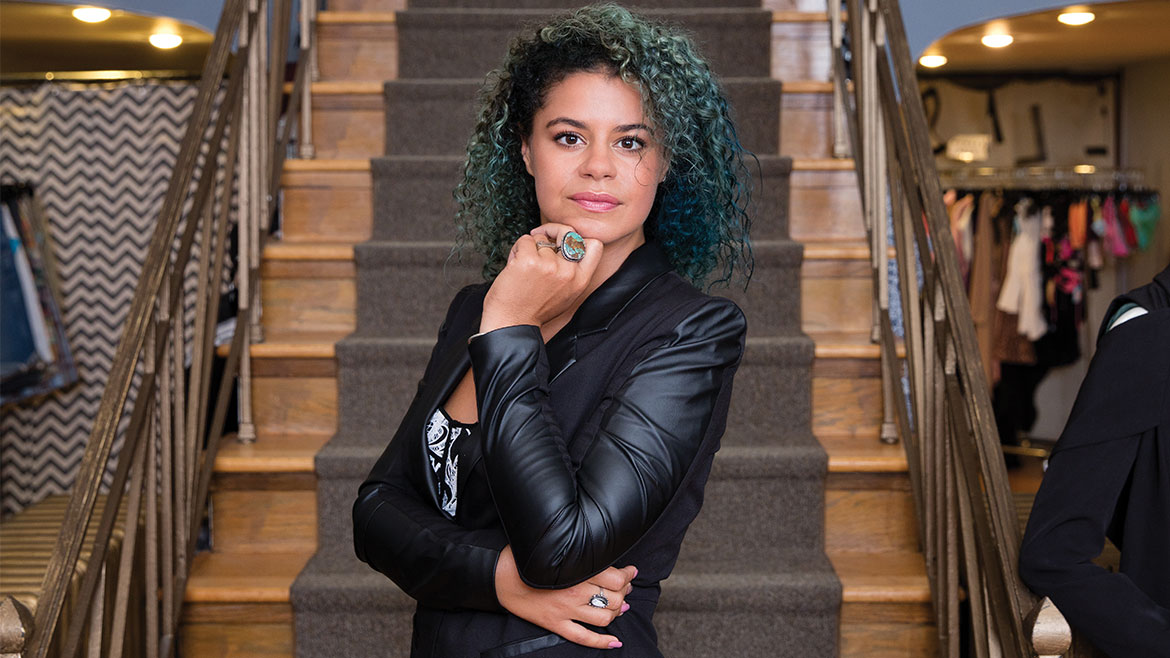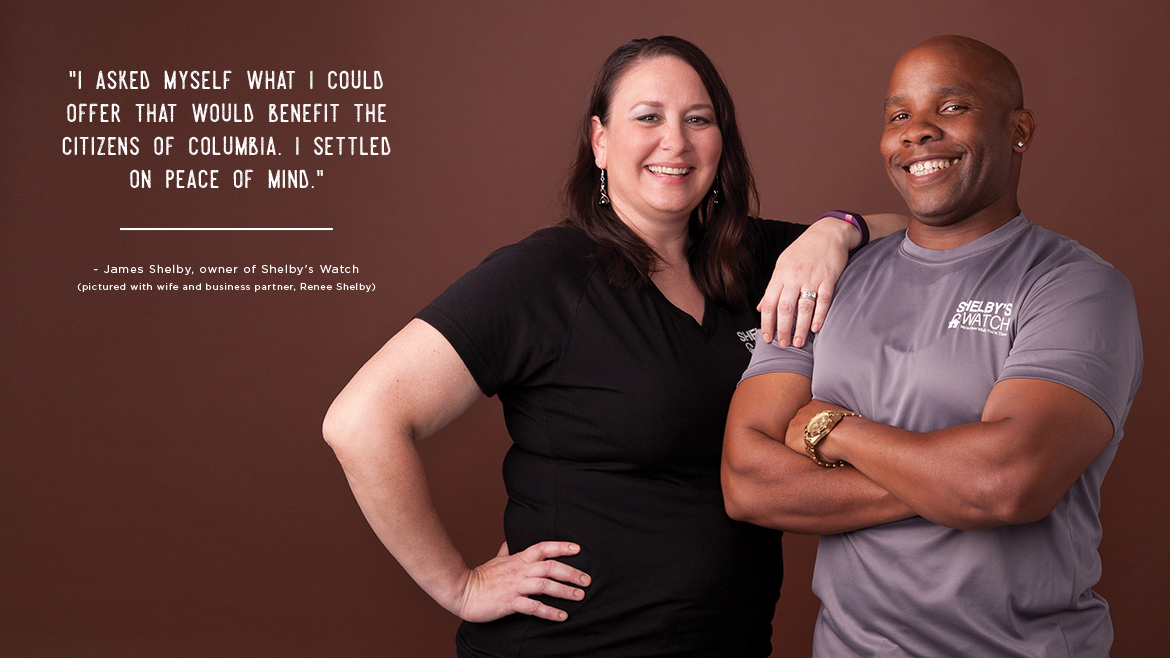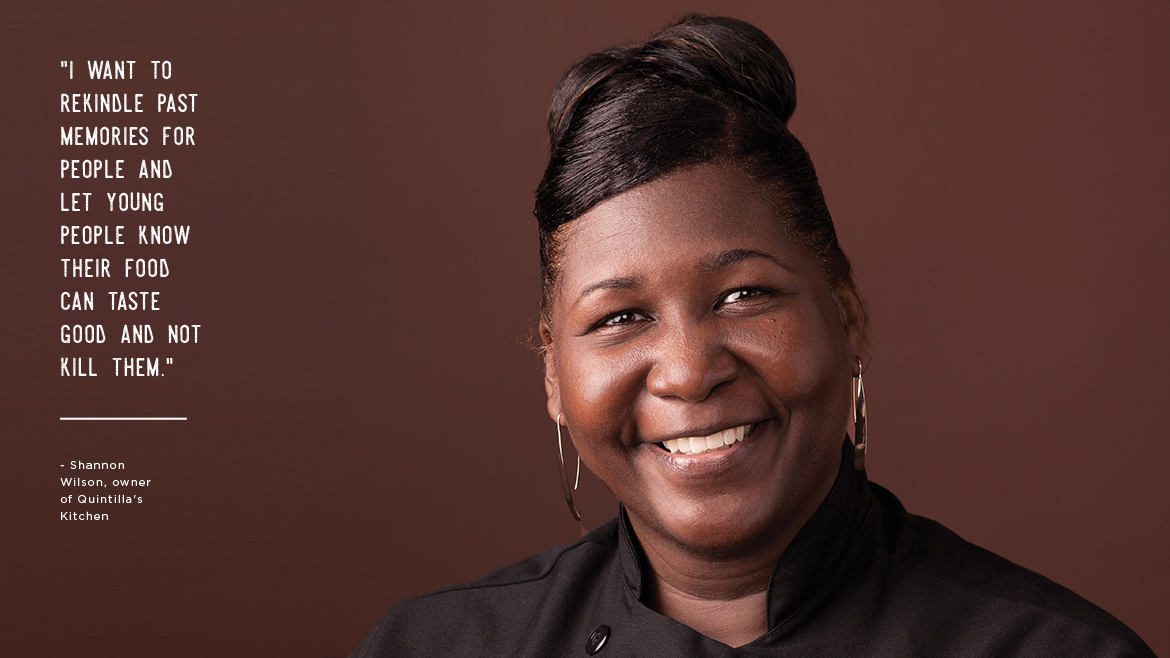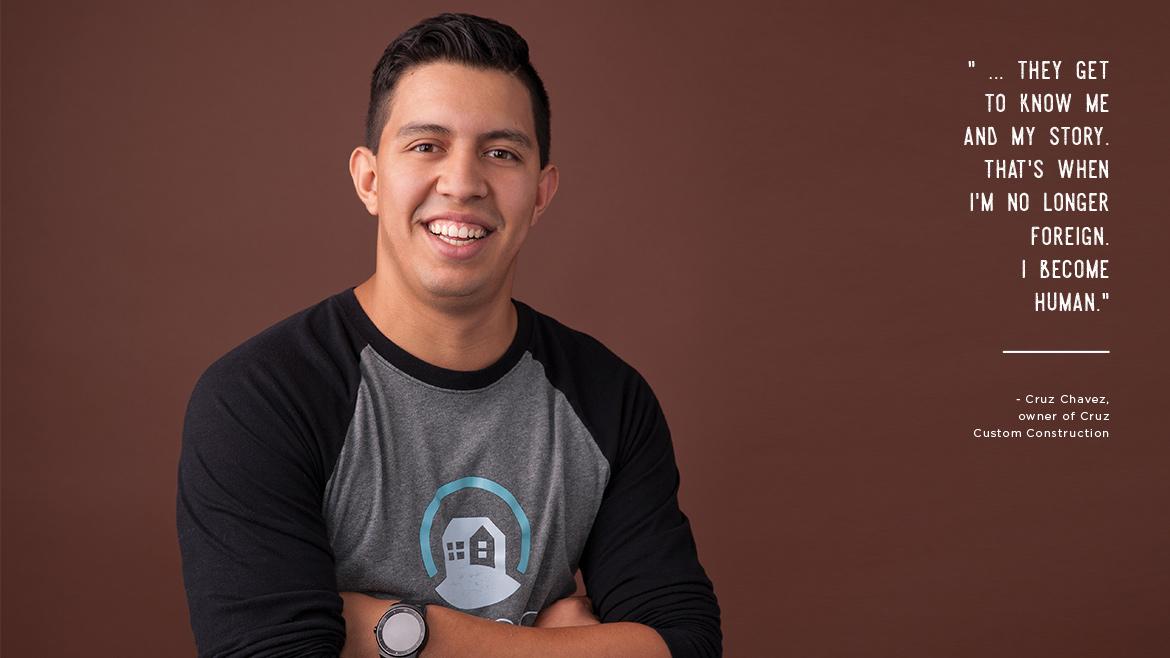Dream Chasers: Minority Business Owners Thrive

Nickie Davis makes a distinct impression. She’s comfortable in her own skin; her turquoise corkscrew curls accent her sense of individuality and her desire to empower others to express who they are.
A hometown girl, Davis immersed herself in Columbia’s fashion scene early on, working for Gap, Natural Groove, Blackberry Exchange, and Swank before launching Muse Clothing in April 2013.
“Clothing is an outlet for the mind and body. It can make you feel strong or portray your softer side,” Davis says. “I love helping customers find an outfit that makes them look and feel amazing.”
In opening her own store, Muse, Davis, 32, wanted to fill an untapped niche by bringing a bigger city feel and fashion-forward taste to Columbia. She chose to focus on alternative street wear, with an added emphasis on U.S.-made items as well as brands and styles with a unique flair.
Owning her own business was always a dream, but for a long time she didn’t believe it would be possible. “It was a terrible experience trying to find a bank,” Davis says. “Then I was introduced to Hawthorn Bank. They took a chance on me and made it happen.”
When Muse Clothing opened three months later, Davis found herself working at 22 S. Ninth St. for the third time in her career. “I wanted to be on Ninth Street,” she says. “It feels a lot like ‘Cheers,’ but younger and more vibrant.”
Davis feels part of this unique stretch of downtown, where she enjoys walking Whedon, her black German shepherd, malamute, and husky mix, engaging in street corner conversations and taking in the sounds of local musicians.
“I think our store was needed here,” Davis says. “It was a necessity.”
As Davis and many other entrepreneurs learn, starting a business is an undertaking fueled by extraordinary passion that is often preceded by substantial roadblocks.
For those who are minorities, those challenges are only amplified. Not all realities are the same.
A Harsh Reality
According to a report by Byndom, Stanton and Associates, a consulting firm hired by the City of Columbia, Muse Clothing represented one of 125 businesses, less than one percent of businesses in the city, owned by minorities when it opened in 2013. Beyond the small percentage of businesses, the firm’s report highlighted the difficulties minorities face to secure startup financing and achieve or sustain growth in their sector.
Columbia city manager Mike Matthes is working on addressing these disparities. In October 2015, he included a social equity initiative in the City’s three-year strategic plan. Part of the objective is to attract new minority-owned businesses and expand existing ones while also reducing the median wage gap between white and minority households by five percent.
Jim Whitt, Columbia School Board president and member of the Central Missouri Opportunity Council, was hired as a consultant by the city for one year. He updated the most recent list of minority- and woman-owned businesses, and it is now available on the City and REDI websites. Whitt, 69, who owned a computer services and video conferencing business in Wildwood, Missouri before moving to Columbia in 2001, is also exploring ways to boost businesses in the area.
“There are a number of thriving minority-owned businesses in our community,” Whitt says, “but we need to do a better job of helping them to become better, stronger, and more prosperous.”
Lorenzo Lawson, the founding director of Youth Empowerment Zone, works alongside Whitt on the Central Missouri Opportunity Council. He is dedicated to supporting youth and minorities from disadvantaged backgrounds.
He tells the story of a 27-year-old male with a prior conviction whom they connected with Columbia Access Television for training on shooting and editing video. As the man developed his skills, his passion for starting a business also surged. Unfortunately, his application for a business license was denied because of his felony.
The result didn’t surprise Lawson, 62, and he knew it didn’t have to be the end of the line. YEZ specializes in understanding state and local systems, so they helped the man get letters of recommendation for his appeal. Lawson also went to the hearing to speak on his behalf. They obtained a business license.
“We have found ways to help people navigate the system so it won’t be so overwhelming,” Lawson says. “We don’t want them to give up. When you look around, there’s an atmosphere of hopelessness. The odds are really great. But I’m committed to help as many as possible, and fight for those who are the downcast in our society, white and black.”

The Determination to Overcome
Entrepreneurs like James Shelby and Shannon Wilson possess a palpable grit to move beyond Columbia’s present limitations and use their skills to help their community thrive.
Shelby, 48, is still known as Officer Shelby almost everywhere he goes. Even those he has arrested will stop him in the mall just to say hello and tell him thank you. With his dynamic personality and 12 years of law enforcement background, it’s no wonder that Shelby’s roots in the community, and his desire to keep it safe, run deep.
In April 2014, Shelby decided to funnel his passion into Shelby’s Watch, a professional home watch and pet care service.
“I asked myself what I could offer that would benefit the citizens of Columbia,” Shelby says. “I settled on peace of mind.”
Shelby admits it took four years of planning and research to pull the trigger.
“I was scared,” he says. “I figured if people had security systems, friends, and neighbors, nobody would use the service.”
Shelby’s fears were assuaged, however, after learning his first three clients owned high-tech alarm systems but still wanted a personal presence on site.
“Succeeding at this business would be a huge sense of accomplishment for James,” says his wife, Renee. “It’s a big dream of his to do something that makes a difference.”
Shannon Wilson, 43, has fond memories of Sunday family gatherings at her Grandma Quintilla’s house. “She had 14 kids,” Wilson says, “and I looked forward to whatever savory, delicious comfort meals she would make for all of us.”
She also remembers tending garden with her grandmother Savannah, from Mississippi. “She was savvy at growing her own fruits and vegetables,” Wilson says, “and I remember being in awe at the things that grew out of the ground.”

When the tastes and smells of Wilson’s past didn’t match up with her experience eating a green apple, she knew it was time to do something about it. With help from Ward 4 councilman Ian Thomas, Wilson opened Quintilla’s Kitchen in May. Her hope is to create a catering business that makes a difference in the way Columbians experience their food.
Wilson has educated herself on the taste differences in locally grown produce, on eating foods in the right season, and how healthy eating reduces the risk of high blood pressure and diabetes. This knowledge fuels the menus she selects.
“I want to rekindle past memories for people,” Wilson says, “and let young people know their food can taste good and not kill them.”
An Outlook of Hope
Starting a hair salon at 21 years old, fresh out of cosmetology school, proved to be an ambitious undertaking for Fran Tibbs. Unlike many established stylists, she had to build her clientele from scratch. This made it hard to generate consistent business and cover her expenses, particularly the hefty rent that came with her downtown location.
“I knew it was something I wanted, but I was young, and the maturity wasn’t there,” says Tibbs, who closed her salon after four years and took a job with CenturyTel, which was Verizon at the time.
But Tibbs is a people person. The predictability and monotony of working in a cubicle didn’t suit her well. She missed being immersed in the conversation and liveliness of the salon. She wanted to cut hair full-time again, and Lula Williams, a retiring stylist known throughout the city, was there to help. Williams handed Tibbs her client list.
This generosity ultimately gave Tibbs a second chance at starting her own salon. For the past seven years, Tibbs, 50, has co-owned Me, My Hair & I at 2503 West Ash St.
“A lot of minorities don’t have that support system to help them get started,” Tibbs says. “You have to find your way on a wing and a prayer. Like me, they just need that little boost.”
This is why Tibbs advocates for more programs and funding for minorities.
Kenny Greene, owner of Monarch Jewelry, in the North Village Arts District, got his business license in 1984. He has seen slow strides in creating opportunities and providing support for minority business owners, especially those in need of a small business loan.
“There’s not a level playing field,” Greene, 66, shares. “People don’t understand that. You can’t do the bootstrap thing if you don’t have boots.”

Valerie Shaw, who recently retired from Commerce Bank as the executive vice president and regional retail director, agrees with Greene.
“I see change,” she says. “It’s slow, but I see things changing. Diversity is on the top of a lot of people’s minds right now, and more positive influences will help minority businesses be successful.”
It’s those involved in the process — groups like the Columbia Chamber of Commerce, the Small Business and Technology Development Centers, and those involved in the city’s projects — who give Shaw hope for the future. “There are a lot of people from many backgrounds wanting to make Columbia and its businesses successful,” she says.
One way the City of Columbia is preparing minorities for the workforce is through the Career Awareness Related Experience, or CARE, program. This is where Tibbs was able to get three years of experience in salons as a teenager, answering phones and sweeping floors. “That’s what really helped me decide what I wanted to do for the rest of my life,” Tibbs says.
Now Tibbs is doing her part to give back. She has several nieces who want to attend cosmetology school. They love being in the salon with their aunt to do little tasks and glean whatever knowledge she’s willing to share.
Greene, who is surrounded by young entrepreneurs in the North Village Arts District, is compelled to do his part as well.
“I’ve been rewarded by Columbia and the business community, so I’m obliged to give back,” he says. “A lot of people around me are just getting started.”
The Human Perspective
For Cruz Chavez, perhaps more than any of his classmates sitting in biochemistry, something seemed to be hanging in the balance. He couldn’t shake the thought that he might not belong here. He didn’t want to waste a decade or more in classrooms and laboratories to become a doctor.
“I had enough foresight to know that [I] would be miserable as a doctor,” Chavez says. “I thought I would eventually like it, but medical school was more of what my family and friends back home expected.”
The son of immigrants from Mexico, Chavez grew up in Livingston County in northwest Missouri, which was 1.2 percent Hispanic or Latino. His mother was known to say: “You’re not going to change their mind. You have to leave no doubt that we’re just as good as them, if not better.” This expectation led Chavez to join every single club in high school, become an all-state athlete, graduate Valedictorian, and set his sights on medical school.

But he turned his back on medical school for the chance to be outside and work with his hands. He found a framing job on Craigslist. That led to a job with a remodeling company, then to a position working for a builder doing large projects. Eventually, he was asked to oversee job sites and discovered he was good at running a crew, tackling projects, and organizing people.
“I told my wife that I wanted to do this on my own,” Chavez says. “We decided that if I could get three month’s work lined up, we would do it.”
Within a week, his dream was a reality, and in June 2015, Cruz Custom Construction was born. Chavez, 26, currently takes on 10 to 15 projects a year, some large, others small. His work has been 75 percent residential and 25 percent commercial. Eventually, he would like to build custom homes.
“I like custom work because it shows I’m a craftsman,” Chavez says. “I’m not interested in putting in bath fans; I’m interested in ripping out three walls and building you the bathroom of your dreams. I might be more expensive and take longer than another company, but I guarantee the result is going to be something different and great.”
Chavez also infuses his business with his personality and ethnicity. He especially likes to share his story with his clients if the opportunity arises. He tells them about how his parents emigrated from Mexico. About growing up with three sisters in a small farmhouse. About being the only Mexican family in a small town. About doing everything possible at school. About attending college with everyone’s expectations on his shoulder. About changing course to chase a dream and do something he loves.
“In Missouri, I’m always going to be different than everybody else,” Chavez says. “But in those moments, they get to know me and my story. That’s when I’m no longer foreign. I become human.”


